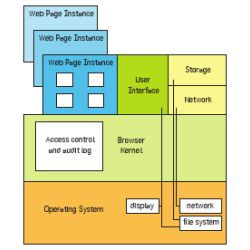Self-driving cars are inching closer to the assembly line, thanks to promising new projects from Google and the European Union.
Alex Wright
Is Google's new Web-based laptop a game-changing computer or a warmed-over netbook?
Web Science Meets Network Science
A pair of divergent scientific communities discusses their similarities and differences, and search for common ground.
After more than 20 years of research and development, are haptic interfaces finally getting ready to enter the computing mainstream?
A novel approach to computational logic is reaching maturity, opening up opening up new vistas in programming languages, proof nets, and security applications.
In today's real-time Web, data streaming applications no longer have the luxury of making multiple passes over a recorded data set.
Type systems are moving beyond the realm of data structure and into more complex domains like security and networking.
The hegemony of the traditional desktop operating system is starting to fracture with the emergence of a new generation of Web browsers that may finally herald the long-awaited convergence of Web and OS.
Contemporary Approaches to Fault Tolerance
Thanks to computer scientists like Barbara Liskov, researchers are making major progress with cost-efficient fault tolerance for Web-based systems.
With sentiment analysis algorithms, companies can identify and assess the wide variety of opinions found online and create computational models of human opinion.
Shape the Future of Computing
ACM encourages its members to take a direct hand in shaping the future of the association. There are more ways than ever to get involved.
Get Involved








